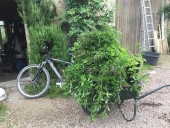posted 5 years ago
Hi Amber! Welcome to Permies and congrats on getting started with gardening!
You asked how to make compost - you'll find endless discussion of that topic here and elsewhere (with a wealth of information) but the basics are pretty simple.
You need carbon (aka "browns" like dead leaves, twigs, cardboard, etc.) and nitrogen (aka "greens" like grass clippings, weeds, coffee grounds, etc.). Different ratios are preferred for different methods but generally try to err on the side of more carbon/browns. Then you need air, moisture, micro-organisms and time. It can take a couple months or a couple of years - more nitrogen/greens will speed it up and make for a "hotter" compost - when it's dark and rich, it's ready. You can turn it if/when you like to accelerate its progress, and wet it thoroughly if it becomes dry, though if it's very wet where you are you might want to cover it. As far as micro-organisms, if you build it they will come, especially if you build it directly on the ground. You can supercharge your compost by adding various things (beneficial microbes, fungi, teas or plant extracts to name a few...) You can build your compost in a pile, or dig it directly into your soil and cover it with soil or mulch.
Cardboard is a great beginning for a garden bed. You can lay it directly on top of grass (or dig the grass out first if it is the kind that likes to invade and you have the time and energy) and layer it with whatever you can get (compost, coffee grounds, wood chips, old straw or leaves...) and then dig holes through it and pop your seedlings/seeds in. Worms and other creatures will work all that stuff in with time and create a lovely, soft soil over time. Just laying on heavy mulch over an area you'd like to garden in future seasons will help to improve the soil there and smother grass and weeds.
You can get a lot of stuff for cheap or free if you look around. And you can find a lot of uses for things you have around already. Old milk jugs and bottles can be mini-greenhouses for starting seeds outdoors. Sticks as trellising or fencing. Wood chips from local arborists. See what you've got in your community and what you can get for cheap/free. That goes for plants, too! Seeds are cheaper than starts, and you can grow and learn a lot by messing around with seeds from produce and bulk grocery bins. Kidney beans, 12-bean soup, live herbs, and more can be planted. I've grown peppers from the seeds that came in a packet of red pepper flakes, and flowers grown from seed collected from parks, road verges and yards. There are seed swaps here and elsewhere, and often people will be glad to help you get started (send me a message if you'd like an envelope of seeds) If you start looking you'll soon find more than you can possibly grow.
Most of all, just don't be afraid to dive in and grow something! Just start somewhere and then, keep going as you like. I wish I had messed around more with growing things before we moved to our house where I could have a "real" garden, but I worried about not doing it right or having to grow in pots or not being able to do enough that it would be worth it. But honestly, as long as you're learning, there's no failure! Ask what you can learn and move on. Try something else, or come back at that thing from a new angle. Try a few different things, watch youtube videos, read book on a topic, whatever appeals to your learning style, but mostly just get out there and try something. Don't worry about getting too overly specific or what someone else says is the right or wrong way to do things. Plants are resilient, they will surprise you - and if they do kick the bucket, toss them in the compost and use the bucket for something new. You'll learn more as you go and find what works best for you and your location and style - and you'll find so many little joys along the way. There's nothing better than seeing flowers you planted bloom or tasting fresh things you grew yourself, finding some new edible or ally.
Once again welcome, and I wish you the best of luck with all your gardening efforts!
Observation is where intelligence is born.

 3
3





 5
5




 6
6




 3
3




 8
8




 1
1




 3
3




 4
4




 2
2




 2
2














 1
1




 4
4










 3
3




 2
2








 1
1








 1
1




 2
2






